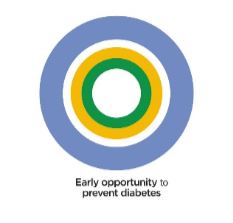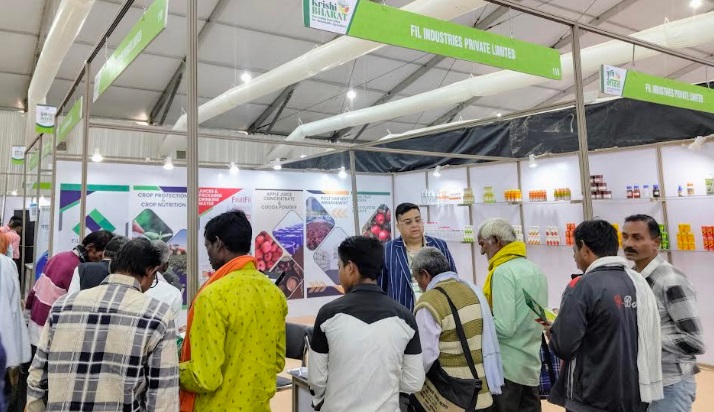Prediabetes is a metabolic disorder that is a precursor to type 2 diabetes. In prediabetes, as there is insulin resistance, the body produces either supra-normal levels of insulin or, in later stages, less than required insulin. Dr Neeta Deshpande, Diabetologist and Bariatric Physician, Belgaum further explains this condition as where the blood glucose level is over the threshold of what is healthy, but it is not high enough to be diagnosed with diabetes. Insulin resistance, inï¬ammation, increased lipolysis, beta- and alpha-cell dysfunction, and poor incretin action are among the pathophysiologic abnormalities that underlie prediabetes.
Prediabetes Awareness Symbol
Studies have now emerged that show that individuals who have prediabetes, run the risk of developing long-term complications like microvascular and macrovascular disorders. If they do not seek proper medical care and guidance, they can develop Type 2 Diabetes too, which is also associated with the development of macrovascular complications.
Pathophysiological Defects in Prediabetes
Dysglycemia is a spectrum that traverses the journey of insulin resistance, hyperinsulinemia, pre diabetes and finally diabetes. The pathophysiological abnormalities seen in prediabetes are thus not much diï¬erent from those seen in frank diabetes.
Pancreatic β-cell activity is lost and insulin resistance increases as dysglycemia naturally progresses. When a person has impaired fasting glucose in the prediabetic condition, there are continuously visible abnormalities in insulin action and secretion.
Macrovascular Complications of Prediabetes
Macrovascular disorders are diabetes-related vascular complications that aï¬ects large blood vessels, particularly the ones supplying blood to the heart. Individuals with macrovascular disorders run the risk of developing Coronary Artery Disease (CAD), Cerebrovascular Disease (CVD), and Peripheral Vascular Disease (PVD).
It is reported that most patients with prediabetes harbor features of insulin resistance (metabolic) syndrome, including upper-body obesity, hypertriglyceridemia, decreased HDL cholesterol levels, and hypertension, among others. Many types of metabolic disorders are prevalent in prediabetic individuals many years before the onset of Type 2 diabetes mellitus. This condition is usually linked to early atherosclerotic changes in blood vessels, which are typically preceded by impaired endothelium-dependent vasodilation, dysfunction of vascular smooth muscle, and heightened arterial stiï¬ness.
Prediabetes is often linked to an increased risk of cardiovascular disease and death in the general population and patients with a history of heart issues. This has led to a rise in early intervention before type 2 diabetes is diagnosed.
Early Intervention in High-Risk Prediabetes
Individuals who have a high risk of developing diabetes, such as subjects who are obese or overweight, women who have had a history of gestational diabetes, etc are required to be tested regularly for both prediabetes and Type 2 diabetes mellitus T2DM as well as for certain cardiovascular diseases.
Early lifestyle intervention is essential for prediabetic individuals. Their health will only improve with a healthier diet, regular physical exercise, and maintaining a healthy weight.
Metformin, a therapeutic drug component used to delay the onset of type 2 diabetes, is the most effective pharmacological agent, it is well-tolerated by the human body and is cost-effective. Metformin is now approved for use in prediabetes in India.
Leading guidelines for managing dysglycemia or cardiovascular risk now recognize metformins role in preventing diabetes in specific subgroups at risk due to prediabetes or non-diabetic hyperglycemia.
Lifestyle Modifications in Prediabetes
Lifestyle modifications are an eï¬ective way to prevent the onset of type 2 diabetes in prediabetic individuals. Upon being diagnosed with prediabetes, a disciplined lifestyle change that leads to weight loss, is a certain way of preventing the onset of type 2 diabetes mellitus. Making a few simple lifestyle changes has the potential to help you one to avoid developing serious health complications later in life. It can avert future issues of nerve, kidney, and even heart damage. It is never too late to start practicing the following things.
Lose extra weight
Be more physically active
Eat healthy plant foods
Eat healthy fats
Avoid fad diets and make holistic healthier choices
Use of Metformin in India
Metformin is a generic and cheap drug that is also widely available with both government and private healthcare providers in India. Its use among those with prediabetes is said to be significantly lower in India. When metformin is used in conjunction with lifestyle modification to avoid type 2 diabetes, there should be no reason for concern. Common worries expressed about the medicalization of “prediabetes” include higher healthcare costs per individual and the possibility that metformin use in prediabetes might result in a reduced focus on lifestyle modifications. But these concerns are mostly unfounded.
Use of metformin may be encouraged in the subset of individuals with prediabetes with multiple risk factors associated with the progression to T2DM. These risk factors include the likes of a strong family history of T2DM, obesity, history of gestational diabetes, occurrence of both impaired fasting glucose and impaired glucose tolerance.
In conclusion
Instead of raising concerns about the medicalization of prediabetes, it will be far more beneficial to treat prediabetes with the seriousness it deserves. Lifestyle intervention forms the first line of defense against diabetes and should be implemented aggressively in prediabetics There is an urgent need to spread awareness on the use of metformin for preventing the onset of T2DM in high-risk ethnicities like South Asian Indian, who also suï¬er from multiple other risk factors, till better alternatives are made available in the future.

















Reader Interactions